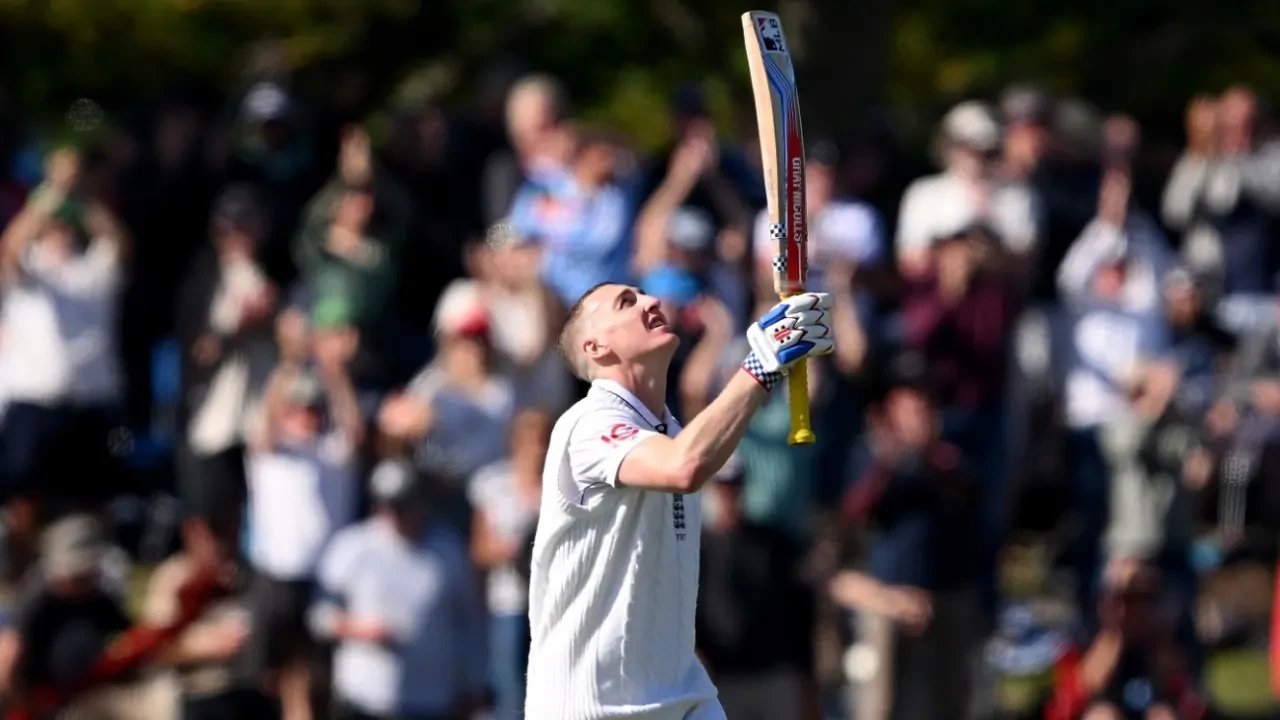Harry Brook rides his luck for century as fielding lapses cloud New Zealand's day

Harry Brook raises his bat after bringing up his seventh Test ton • Joe Allison/Getty Images
Christchurch, November 29:
England 319 for 5 (Brook 132*, Pope 77) trail New Zealand 348 (Williamson 93, Phillips 58*, Carse 4-64, Bashir 4-69) by 29 runs
You have to make hay while the sun shines, as Harry Brook proved in two distinct interpretations of that hackneyed old adage. His seventh Test century - and sixth away from home - was a magnificent and crucial contribution to a day of wildly contrasting weather patterns, as England recovered from a torrid working-over under overcast morning skies to storm towards first-innings parity by the close, as the sun broke back through for the day's final two sessions.
But rarely can New Zealand have clouded their own fortunes with a spate of fielding lapses to match those that they served up on this enthralling second day. Six clear-cut chances went begging in the course of England's 319 for 5, including four for Brook alone - and at almost rhythmical interviews too: on 18, 41, 70 and 106, as if designed to douse their bowlers' morale any time they looked ready to turn back the tide.
The upshot is a match situation that now feels like England's to blow. The sense after they'd prised out eight first-day wickets after choosing to bowl first was that this wicket would get better and better for batting, and so it seemed to prove. Brook himself built key stands of 151 for the fifth wicket with Ollie Pope, who responded to his wicketkeeping reshuffle with an excellent 77, and an unbeaten 97 with his captain, Ben Stokes, who was ominously placed on 37 from 76 at stumps. Stokes did, however, get a life of his own on 30 in the day's closing overs, as Tom Latham spilled catch No.6, and his third of the day, this time at short cover.
But England had not bargained for the mayhem that greeted them while the clouds were in situ for the first three hours of play. The hot, windy weather that had greeted the first day's play was replaced in the morning by cooler, overcast conditions with a gentle breeze that proved perfect for helping the ball talk, with the degree of swing on offer being almost double that which England had managed. The upshot was that New Zealand found themselves bowling in the conditions that England themselves had envisaged exploiting after winning the toss.
And once New Zealand's first innings had been wrapped up for 348, after the addition of 29 runs in 40 minutes, the ferocity of their bowling onslaught had echoes of their astonishing 46-all-out display against India in Bengaluru last month.
Zak Crawley was the first to go, lbw to Matt Henry for a 12-ball duck that left his average against New Zealand at a grim 10.43, but the most stunning blows were struck by the debutant Nathan Smith in the final over before lunch, as he extracted his fellow newbie Jacob Bethell for 10, then, critically, England's kingpin, Joe Root, also for a duck.
Bethell's maiden innings at No. 3 could scarcely have unfolded in tougher conditions. He was made to wait 13 deliveries before nudging his first run through the leg-side, and hadn't added to his score in 13 more, until the introduction of Smith allowed him to free his arms with a brace of boundaries: one off the pads, the other through backward point.
Smith, however, got the last laugh at the start of his second over - and then some. With just minutes of the session remaining, he served up a perfect seaming delivery, which angled in at the left-hander from round the wicket, then held its line as it bit and climbed into the edge.
Smith had an agonising wait while the third umpire checked for a no-ball, but with the euphoria still surging, he finished the session with an even more critical incision. Root faced down three deliveries, two of which were called as no-balls this time, but his fourth was on a wider line and nipped back off the surface, taking an under-edge into the stumps. It was an astonishing introduction for a bowler with a bustling energy and action redolent of Australia's Andy Bichel, and as the teams left the field, New Zealand looked good for several more such moments.
Ben Duckett at least resisted in his idiosyncratic fashion, bashing six fours in a 62-ball 46, but he didn't so much ride his luck, as turn it into a bucking bronco. He survived the day's first missed chance, to Latham at second slip on 23 off Henry, then got away with two further inside-edges and a spliced pull over deep third before the beanpole seamer Will O'Rourke induced a fatal top-edge to deep backward square.
At 71 for 4, England were reeling, and their predicament could have been insurmountable had Brook fallen to the first of his four lives in the very next over, a bad miss at gully by Glenn Phillips on 18 that looked all the more glaring when, some 30 overs later, he pulled off a one-handed screamer at backward point to end Pope's doughty stay. Smith had been the luckless bowler, as was the case when Brook was on 41, as Latham spilled his second of the innings, another bad miss at first slip.
By then, however, the sun was beginning to creep through, and England's unquenchable desire to be proactive was already clawing back some of the lost ground. Pope, at No. 6 for this Test - ostensibly because he is keeping wicket, but also as a consequence of his grim tour of Pakistan - was once again frenetic from the outset, as he took on O'Rourke's height and bounce with a series of streaky slaps over the cordon, one of which he knew very little about.
But, with Brook following suit with a startling flick for six over fine leg off Henry, England's run-rate began to creep back towards the habitual 4-an-over pace with which they have subdued so many bowling attacks in the recent past. By tea, both men had marched through to their fifties against a now middle-aged ball - Brook with a second six over fine leg, Pope with a nudge to leg from a brisk 59 balls - and as they kept up that intensity into the evening session, New Zealand's errors continued to stack up.
Devon Conway spilled chance No.4 at deep midwicket, as Brook wound into a slog-sweep on 70 off Phillips, and by then his century was pre-ordained. He duly moved deep into the 90s with an outrageous lap-scoop over the keeper's head off Southee, whom he then cracked through deep point to bring up his century from 123 balls. Earlier he had become the eighth fastest player, in terms of innings, to reach 2000 Test runs, and second only to Duckett in terms of balls faced: a brisk 2300. There was time yet for one last let-off; a clanger behind the stumps from Blundell down the leg-side, although seeing as the umpire also missed the edge and singled four byes, maybe there really was no way of dislodging him.
The day's dramas had been telegraphed during the end of New Zealand's own innings. Phillips converted his overnight 41 to an unbeaten 58, but it was not an easy stay, as epitomised by his audible cry of "oh you weasel!" as Chris Woakes beat him with an outswinger. He also had a scare on 42 when Carse, generating a good head of steam, smacked him hard in the grille via a top-edge off the splice, and in a sign of things to come, was also dropped in the same over by Root at slip, a tough diving chance to his right.
But Carse had already done for Southee with his first ball of the day, and eventually plucked out O'Rourke's off stump with an outswinging yorker, to close out the innings with career-best figures of 4 for 64 in his third Test. It was a reminder that England too have the bowlers to compete on this intriguing surface. If they have the catchers too, they will believe this game is back in their grasp.










Leave Comment